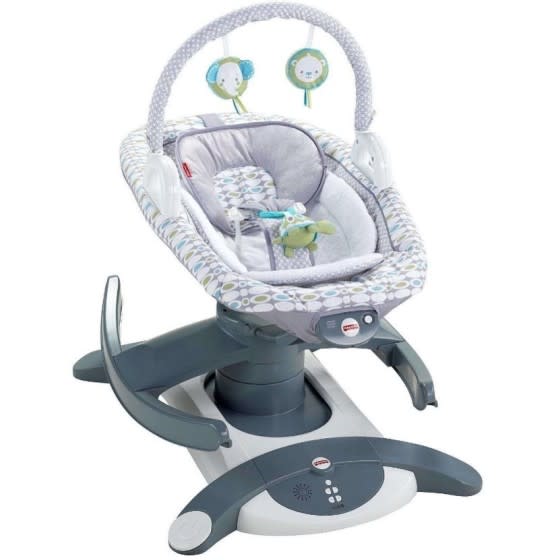Infant sleeper makers ignored safety warnings, report finds

Lawmakers on Monday warned manufacturers of baby sleepers that if they don’t improve internal safety procedures following a series of recalls linked to dozens of infant deaths, Congress would step in with tougher consumer protection laws.
"Stronger regulation could prevent these tragedies," said Rep. Carolyn B. Maloney (D-N.Y.), chairwoman of the House Committee on Oversight and Reform.
The admonishment came in a hearing at the conclusion of a congressional investigation into safety failures among infant products.
The probe found that toy maker Fisher-Price "ignored critical warnings" from experts and foreign regulators about its Rock ’n Play Sleeper, according to a report released Monday.
Executives from Fisher-Price and its parent, El Segundo-based Mattel, defended their safety procedures. Chuck Scothon, senior vice president and general manager of Fisher-Price, told lawmakers that the company's safety team "conducted significant consumer testing" on the sleeper and made appropriate design changes.
Last week, the Consumer Product Safety Commission voted to ban a range of inclined infant sleeping products, including the Rock ’n Play, which was recalled in 2019 after almost a decade on the market. Roughly 5 million units had been sold, and it was tied to dozens of infant deaths across the country.
Last week, Fisher-Price recalled its Rock ’n Glide Soothers and Soothe ’n Play Gliders after reports of four infant deaths.
Rock ’n Play and similar sleepers are padded bassinets that keep babies at a 10- to 30-degree angle, intended to help them sleep. But a 2018 study funded by the Consumer Product Safety Commission concluded that the design is dangerous. Regulators warn that infants unrestrained in the sleepers could roll onto their stomachs during sleep and suffocate.
Experts generally recommend that babies sleep on their backs on a flat, firm surface without blankets or other soft objects that could cause suffocation.
A 2019 Consumer Reports investigation revealed that Fisher-Price and Mattel did not consult with pediatricians while designing the Rock ’n Play, which was the first inclined sleeper available for purchase in the United States.
Scothon said Fisher-Price retained two doctors to evaluate the sleeper in 2016, and both said it was safe. In 2018, after the product safety commission raised further concerns about infant deaths linked to the sleeper, Fisher-Price hired an engineering firm to evaluate the product and statistically analyze how many children had been injured or killed while using it. Scothon said the firm concluded that infant deaths occurred "less frequently" in the sleeper than in cribs, bassinets and cradles.
"Until the Rock ’n Play Sleeper’s recall, this item was the gift that I gave to friends and expecting parents," Scothon said. "The Rock ’n Play Sleeper, like so many of our products, was also used extensively by Fisher-Price employees and their families. I assure you that everyone at Fisher-Price believes that every product we offer is safe, and we do not and would never sell any product about which we thought otherwise."
But lawmakers said faster action by the company might have prevented deaths, including that of a 2-month-old who was found with blood around his nose in the Rock ’n Play in 2018. The baby was taken to Los Robles Regional Medical Center in Thousand Oaks and pronounced dead, according to an incident report from the commission's National Injury Information Clearinghouse.
The product was also linked to the death of 15-week-old Alexander Thompson of Pennsylvania. His mother, Sara, told lawmakers her son would have been 10 years old on Saturday.
Rep. Glenn Grothman (R-Wis.) had a tense exchange with Scothon when pressing the executive to directly answer questions about how and when children died in Fisher-Price's sleepers.
"Well, we're not getting far here," Grothman said.
Rep. Pat Fallon (R-Texas) admonished company executives for failing to respond quickly to reports of nearly 100 deaths worldwide.
"It concerns me greatly that an American company would see that, and have full knowledge that Australia and Canada wouldn't allow this product to be sold," he said. "Maybe legally you could sell the product in the United States, but I just don't feel it was the moral thing to do."
Mattel Chief Executive Ynon Kreiz said the company has made safety strides in recent years, creating an executive position to oversee product safety efforts and founding an expert council to provide recommendations during the design process. It also launched "Safe Start," an educational campaign for parents; the first video, published days before the hearing, was a short tutorial that emphasized following safety instructions included with sleeping products, using safety restraints and moving children who fall asleep into products intended for it.
Kreiz was hesitant, however, when Rep. Jackie Speier (D-Hillsborough) asked him whether he would support an effort to repeal a section of the Consumer Product Safety Act that requires the commission to allow the manufacturer to comment on the accuracy of information before it is disclosed to the public. The commission must review and analyze the information in light of the company's comments before releasing it.
"We would be more than happy to collaborate with the regulators to improve every aspect of consumer safety," Kreiz said.
When pushed, Kreiz said he'd "need to understand [the section] better." Ultimately, he said he would support removing the section but noted that "some information that is in the market is inaccurate and not always correct."
Thompson, who spent nearly a decade trying to figure out why and how her son died in 2011, "with absolutely no answers," said her family struggles to trust large companies and their products. She is especially wary of products for children.
"We miss him every day," she said. "We have two younger children who constantly ask about their older brother in heaven, and it's a hard subject to discuss. ... I implore you to please make it impossible for things like this to ever happen again."
This story originally appeared in Los Angeles Times.
